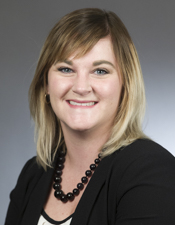Proposed update to law targets fraud in economic assistance programs
The Minnesota Family Investment Program, the Child Care Assistance Program, and General Assistance are all intended to help people going through a difficult time get back on their feet.
But changes are needed to prevent people from taking advantage of these programs “who clearly [have] the resources to fully support themselves,” Brad Thiel, director of Anoka County’s Economic Assistance Department, told the House Human Services Finance and Policy Committee Tuesday.
HF822, sponsored by Rep. Erin Koegel (DFL-Spring Lake Park), would modify the way self-employment income is treated when determining eligibility for the state’s economic assistance programs to “weed out waste, fraud, and abuse,” she said.
It was laid over for possible inclusion in an omnibus bill.
A companion, SF616, is sponsored by Sen. Jim Abeler (R-Anoka) and awaits action by the Senate Human Services Reform Finance and Policy Committee.
“Some self-employed people pay most or all of their personal expenses using business or co-mingled accounts,” Thiel said. “The current statute … does not clearly define what income is in these situations.”
The bill would include “any business accounts used to pay expenses not related to the business” in the list of items needed to be verified when determining program eligibility and asset or personal property limitations.
It is not intended to create any unnecessary barriers for people in genuine need or to blur the distinction between county workers determining eligibility and fraud investigators, Thiel said.
Small-business owners with genuinely low incomes, who are legitimately reinvesting in their businesses, would not be impacted by the change, said Rep. Jennifer Schultz (DFL-Duluth), the committee chair.
“We’re not talking about folks with low incomes. If you’re self-employed and you still qualify, that’s fine,” Thiel said.
In Anoka County, a married couple with several children who owned and operated several businesses claimed only $1,000 in month income with $810 in monthly expenses when applying for economic assistance. But their lifestyle didn’t match their claims, Thiel said.
A county investigation discovered that – using business accounts – the couple purchased a $350,000 home with a $20,000 down payment, owned three vehicles with personalized license plates and met all the monthly payments, and reported their respective annual incomes as $105,000 and $45,000 in credit applications.
“We were unable to fully prosecute them,” and the family is still receiving benefits, Thiel said.
The recommendation comes from a working group convened by the Department of Human Services, including the Department of Revenue and counties, to look at this specific issue, Koegel said.
Related Articles
Search Session Daily
Advanced Search OptionsPriority Dailies
Legislative leaders set 2026 committee deadlines
By Lisa Kaczke Legislative leaders on Tuesday officially set the timeline for getting bills through the committee process during the upcoming 2026 session.
Here are the three deadlines for...
Legislative leaders on Tuesday officially set the timeline for getting bills through the committee process during the upcoming 2026 session.
Here are the three deadlines for...
